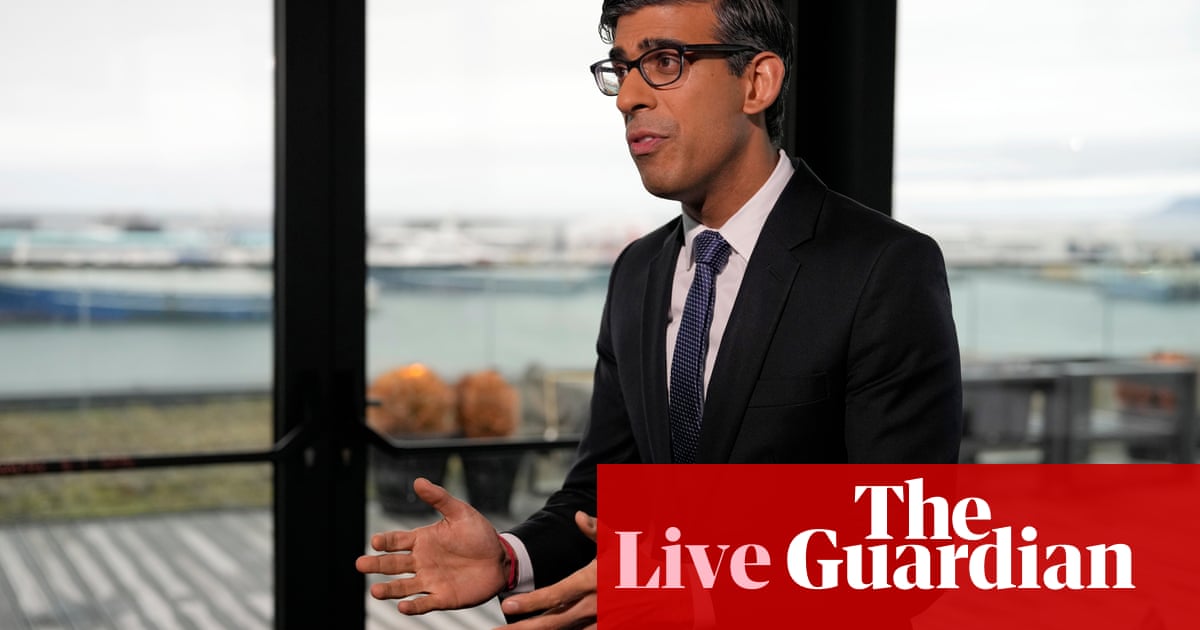
Owen Paterson takes government to European court of human rights saying lobbying probe breached his right to privacy
Owen Paterson, the former Tory cabinet minister and arch Eurosceptic who resigned from parliament last year after an inquiry found he had broken the rules banning MPs from paid lobbying, is taking a case to European court of human rights.
As the court explains in a summary of the case, Paterson “complains that his article 8 rights [to privacy] were infringed [by the inquiry process that led to his resignation], as the public finding that he had breached the code of conduct damaged his good reputation, and that the process by which the allegations against him were investigated and considered was not fair in many basic respects”.
Joshua Rozenberg, the legal commentator, seems to have spotted the listing first.
Like most Brexiters, Paterson has never been fond of the European court of human rights – although of course this court is not part of the EU.
But, in the light of his decision to launch legal action, Paterson may be glad the government never followed the advice of the prominent Tory who gave a speech in 2014 saying the UK should break free of the European convention on human rights, on which the court adjudicates. That was Paterson himself.
Paterson claims that the inquiry into the allegations against him was unfair because he did not get a proper right of appeal. MPs on the Commons standards committee did not accept that – they took evidence from Paterson after an inquiry from the parliamentary commissioner for standards found he broke the rules, and arguably that part of the process functions as an appeal – but Paterson was able to persuade Downing Street that he had a case, and Boris Johnson ordered Tory MPs to vote down the recommendation saying he should be suspended.
The spectacle of Tory MPs voting to protect a colleague who broke the rules was disastrous for Johnson, who quickly realised he had made a huge mistake and ordered a U-turn. That prompted Paterson’s resignation, but the episode is seen as the start of the process that led to Johnson himself being forced to resign less than a year later.
Afternoon summary
Owen Paterson, the former MP at the centre of a lobbying scandal that engulfed Boris Johnson’s government, is taking the UK to the European court of human rights to challenge the finding that he repeatedly broke the rules on paid advocacy. A peer, Lord (Nazir) Ahmed, has launched a similar legal action over an inquiry in the House of Lords that upheld a complaint of sexual misconduct against him. (See 5.44pm.) Ahmed was jailed earlier this year over unrelated sexual offences.
Keir Starmer has issued a challenge to business leaders, vowing to end the “short-term fix” of using foreign workers to plug labour shortages and seeking to toughen up his party’s stance on immigration.
The government is postponing a vote scheduled for Monday on the levelling up bill in the face of a potential rebellion by Tory MPs backing an amendment that would abolish mandatory housing targets, my colleague Jessica Elgot reports.
The amendment has been tabled by Theresa Villiers, the former cabinet minister.
Priti Patel is threatening to launch a formal complaint after Home Office sources made a “categorically untrue” claim that she oversaw a two-month summer “pause” in finding hotel rooms for asylum seekers.
The Conservatives are bracing themselves for a slew of departures by MPs, with many expected to be announced by the end of the year, as the former work and pensions secretary Chloe Smith became the latest to decide not to stand at the next election.
Rail passengers will face further disruption across Britain at Christmas after the RMT union announced a series of 48-hour strikes in December and January.
Peer joins Owen Paterson in taking government to European court of human rights over misconduct inquiry
Owen Paterson is not the only former parliamentarian taking the UK government to the European court of human rights alleging that a parliamentary misconduct investigation has not been fair to him.
The court in its summary says a peer is also taking the government to court over the handling of a sexual misconduct complaint about him. The peer appealed unsuccessfully against a ruling saying he should be expelled from the Lords for what he did, and he resigned from the house before peers could vote to expel him.
The peer claims that his rights to a private life were breached by the inquiry, and that the process was discriminatory, because, as he was a member of parliament and as parliamentary privilege was involved, he did not have the right to go to court to protect his name that other people would have had.
The court just identifies the applicant as N. A. in its summary, but the facts as set out match what happend to Lord (Nazir) Ahmed, who resigned from the Lords in 2020 claiming he had been unfairly accused of sexual misconduct.
Labour"s briefing on how it would impose new conditions on firms needing foreign workers
The Labour party has issued a briefing to journalists giving a little bit more detail of how it would work with business to end “immigration dependency”. For the record, here are three extracts.
On how new conditions might be imposed on firms needing foreign workers
The current immigration system exists entirely in isolation from long-term workforce plans. The result is that employers face delays in getting skilled workers in place, workers are not getting the skills they need to get on, stagnant pay and poor conditions are commonplace in sectors of the UK economy, and innovation is held back.
Labour will speak to organisations to link the points-based system to training, skills and employment standards - to ensure our economy has a plan for the skilled workforce it needs.
As part of this process, the party will consider international comparators, where the wider labour market and immigration are much better linked, like in Australia …
We want to ensure that where there are shortages that need to be filled through international recruitment, there is training, or active workforce measures to address the causes here at home. Our new skills body, Skills England will take on a roll in assessing and recommending action to address skills gaps. After a certain amount of time, sectors cannot expect support with migration without taking action on skills.
On how skills training might be improved
To drive a revolution in learning and skills and achieve sustainable economic growth across the country, Labour will give businesses the flexibility they need to train their workforce and deliver growth, by turning the Tories’ failed apprenticeships levy into a ‘Growth and Skills Levy’. The party will go further and devolve adult education skills spending to combined authorities, and establish a new expert body – Skills England – to oversee the national skills effort.
On the value of migrant workers
Our economy and our communities have long benefited from people coming here from all over the world to work, from building our biggest businesses, to sustaining our public services to leading our scientific research and innovation to caring for our loved ones. That has made us the country we are today. People choosing to come to the UK will continue to be important for our economy and that is exactly why the system needs to be properly managed in the interests of workers and businesses.
The final paragraph shows that Labour cannot fairly be accused of “belittling” the contribution made by migrant workers. Jeremy Corbyn implied this in a tweet this morning. (See 1.36pm). And the Green party made the same claim in its response to the Starmer speech, accusing the Labour leader of “trying to outflank the Tories on anti-migrant rhetoric”.
Green party criticises Starmer"s stance on Brexit, saying it would rejoin customs union, and eventually EU
The Green party has criticised Keir Starmer for saying Labour would not rejoin the EU single market or the customs union. In a statement on Starmer’s speech to the CBI, Carla Denyer, the Green party’s co-leader, said:
Six years on from the referendum, we can see clearly there are no economic opportunities from Brexit; nor any social or environmental benefits. Brexit has been a disaster.
The Office for Budget Responsibility said last year that the impact of Brexit on the UK economy will be worse in the long run than the coronavirus pandemic. So Keir Starmer talking of the importance of economic growth within the current Brexit arrangements is to ignore the elephant in the room standing in the way of economic success.
The Green party wants the UK to rejoin the customs union, maintain alignment with EU law where it offers environmental and social protections and reinstate freedom of movement. We also want to rejoin the EU at some point in the future when the conditions are right. And the majority of Brits now agree with us. In a recent poll, 53% of people said they want to rejoin the EU compared to 34% who want to stay out.
At the afternoon Downing Street lobby briefing the No 10 spokesperson said that the government was aware of that Owen Paterson was taking it to the European court of human rights, but did not offer any comment.
The legal commentator Joshua Rozenberg has more on Owen Paterson taking the UK government to the European court of human rights. (See 3.45pm.) He says the court has not yet decided that the case is admissable.
What Owen Paterson said about European convention on human rights in 2014
This is what Owen Paterson said about the European convention on human rights in a speech in 2014.
Much of the problematical immigration into this country stems not just from the EU but from the European convention of human rights. This is exacerbated by the rulings of judges in the court at Strasbourg and by our own UK courts implementing the Human Rights Act. Repeal of the HRA and adoption of new bill of rights, breaking free from the ECHR, would also relieve us of migrant pressure, including such absurdities as not being able to deport illegal immigrants who come to us via Calais, because – according to our judges – France is not a “safe” country for asylum seekers.
Outside the EU and freed from the writ of the ECHR, “freedom of movement” within the EEA could be limited to free movement of workers, without having to accept dependants and members of their extended families.
Raab signals opposition to withdrawing from ECHR, saying there would be "immediate downsides" and no clear benefits
Back at the Commons justice committee, Dominic Raab, the justice secretary, has just signalled that he does not favour withdrawing from the European convention on human rights. He said that he could see “immediate downsides”, such as the fact that the Good Friday agreement assumes an ongoing commitment to the convention, and that he was “not entirely clear what the upsides would be”. Withdrawing from the convention would not solve the small boats problem, he said, because the UK would still face legal obligations to protect asylum seekers.
He said he would want to see a proper cost-benefit analysis of any proposal to withdraw.
RMT announces four weeks of rail disruption over December and January, including four 48-hour strikes
The RMT rail union has announced four strikes, each lasting 48 hours, taking place in December and January. In a news release it says:
Rail union, RMT will put on a series of 48-hour strikes in December and January after industry bosses failed to offer any new deals to reach a settlement.
Over 40,000 members across Network and 14 train operating companies will take strike action on 13, 14, 16 and 17 December and on January 3,4,6 and 7.
There will also be an overtime ban across the railways from 18 December until 2 January, meaning RMT be taking industrial action for 4 weeks.
Explaining its reasons for the new strikes, the union said:
The union suspended previous strike action in good faith to allow for intensive negotiations to resolve the dispute.
Yet, Network Rail have failed to make an improved offer on jobs, pay and conditions for our members during the last two weeks of talks.
At the same time Rail Delivery Group, representing the train operating companies, have also broken a promise to make a meaningful offer on pay and conditions and even cancelled negotiations that were due to take place yesterday.
We also have evidence from all 14 of the train companies denying that Rail Delivery Group has the authority to conduct negotiations on their behalf, even as the RDG urged us to come back to the table.
In a statement Mick Lynch, the RMT general secretary, said:
This latest round of strikes will show how important our members are to the running of this country and will send a clear message that we want a good deal on job security, pay and conditions for our people.
We have been reasonable, but it is impossible to find a negotiated settlement when the dead hand of government is presiding over these talks.
The employers are in disarray and saying different things to different people sometimes at the same time. This whole process has become a farce that only the new secretary of state can resolve. When I meet him later this week, I will deliver that message.
In the meantime, our message to the public is we are sorry to inconvenience you, but we urge you to direct your anger and frustration at the government and railway employers during this latest phase of action.
Owen Paterson takes government to European court of human rights saying lobbying probe breached his right to privacy
Owen Paterson, the former Tory cabinet minister and arch Eurosceptic who resigned from parliament last year after an inquiry found he had broken the rules banning MPs from paid lobbying, is taking a case to European court of human rights.
As the court explains in a summary of the case, Paterson “complains that his article 8 rights [to privacy] were infringed [by the inquiry process that led to his resignation], as the public finding that he had breached the code of conduct damaged his good reputation, and that the process by which the allegations against him were investigated and considered was not fair in many basic respects”.
Joshua Rozenberg, the legal commentator, seems to have spotted the listing first.
Like most Brexiters, Paterson has never been fond of the European court of human rights – although of course this court is not part of the EU.
But, in the light of his decision to launch legal action, Paterson may be glad the government never followed the advice of the prominent Tory who gave a speech in 2014 saying the UK should break free of the European convention on human rights, on which the court adjudicates. That was Paterson himself.
Paterson claims that the inquiry into the allegations against him was unfair because he did not get a proper right of appeal. MPs on the Commons standards committee did not accept that – they took evidence from Paterson after an inquiry from the parliamentary commissioner for standards found he broke the rules, and arguably that part of the process functions as an appeal – but Paterson was able to persuade Downing Street that he had a case, and Boris Johnson ordered Tory MPs to vote down the recommendation saying he should be suspended.
The spectacle of Tory MPs voting to protect a colleague who broke the rules was disastrous for Johnson, who quickly realised he had made a huge mistake and ordered a U-turn. That prompted Paterson’s resignation, but the episode is seen as the start of the process that led to Johnson himself being forced to resign less than a year later.












